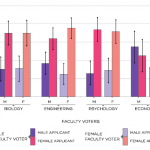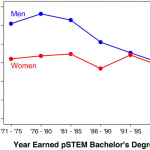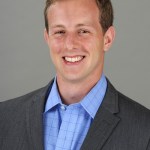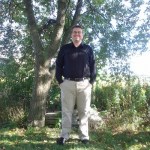Academic recruitment procedures in Sweden are a mess. There are at least four strong contradictory forces that impact them.
Meritocracy. As Head of Department you are legally obliged to find and employ the most qualified person on the job market, even if it's just for six months. This is after all the public sector.
Labour laws. As Head of Department you are legally obliged to give a steady job to anyone who has worked at your uni for a total of four semesters in the past five years, regardless of their qualifications.
Funding. As Head of Department you cannot give anyone a steady job unless…
Jobs
Inside Higher Ed ran a piece yesterday from a Ph.D. student pleading for more useful data about job searching:
What we need are professional studies, not just anecdotal advice columns, about how hiring committees separate the frogs from the tadpoles. What was the average publication count of tenure-track hires by discipline? How did two Ph.D. graduates with the same references (a controlled variable) fare on the job market, and why? What percentage of tenure-track hires began with national conference interviews? These are testable unknowns, not divine mysteries.
From the age-old Jobtracks…
One of the evergreen topics for academic magazines like Inside Higher Ed and The Chronicle of Higher Education is faculty "mentoring." It's rare for a week to go by without at least one lengthy essay on the topic, many of which recirculate multiple times through my various social media channels. The latest batch of these (no links, because this isn't about the specific articles in question) prompted me to comment over in Twitter-land that:
Articles about "mentoring" of faculty are great for reminding me of all the ways I'm atypical for an academic personality-wise.
— Chad Orzel (@orzelc)…
In yesterday's post about the lack of money in academia, I mentioned in passing that lack of funding is part of the reason for the slow pace of progress on improving faculty diversity. That is, we could make more rapid progress if we suddenly found shitloads of money and could go on a massive hiring binge, but in the absence of flipping great wodges of cash, change comes more slowly.
This, naturally, sparked a sort of morbid curiosity about whether the scale of this problem would be quantifiable, and of course, there's the AIP Statistical Research Center offering numbers on all sorts of…
Over in Twitter-land, somebody linked to this piece promoting open-access publishing, excerpting this bit:
One suggestion: Ban the CV from the grant review process. Rank the projects based on the ideas and ability to carry out the research rather than whether someone has published in Nature, Cell or Science. This could in turn remove the pressure to publish in big journals. I’ve often wondered how much of this could actually be drilled down to sheer laziness on the part of scientists perusing the literature and reviewing grants – “Which journals should I scan for recent papers? Just the big…
Two positions of possible interest to academic job seekers:
-- First, we're hiring again in the Union college Department of Physics and Astronomy:
We invite applications for a tenure-track Assistant Professor position starting in September 2016, with a preference for an experimental physicist working in either biophysics or soft condensed matter. We encourage applications from interdisciplinary scientists and those who could make use of the College’s shared instrumentation resources (including AFM, SEM, micro- Raman and micro-FTIR instruments and IBM cluster computer; see http://www.union.…
Heather Cooley and Peter Gleick
California is in a severe drought – four years long now. But what does the drought really mean for the things we care about: food production, fisheries, industrial activities, rural communities? As part of the work of the Pacific Institute to evaluate both the impacts of water problems and identify smart solutions, we’ve just released the first comprehensive assessment of the actual impacts of the drought for California agriculture.
Many commentators and analysts have worried especially about California’s agricultural sector, which is a major water user and has…
A few things about the academic job market have caught my eye recently, but don't really add up to a big coherent argument. I'll note them here, though, to marginally increase the chance that I'll be able to find them later.
-- First, this piece at the Guardian got a lot of play, thanks in part to the dramatic headline Science careers: doomed at the outset but even more thanks to the subhead "Has it become harder for graduate students to thrive, and are our best potential scientists giving up on academia?" Most of the people I saw re-sharing it used basically just that last clause, often…
I continue to struggle to avoid saying anything more about the Hugo mess, so let's turn instead to something totally non-controversial: gender bias in academic hiring. Specifically, this new study in the Proceedings of the National Academy of Science titled "National hiring experiments reveal 2:1 faculty preference for women on STEM tenure track" with this calm, measured abstract that won't raise any hackles at all:
National randomized experiments and validation studies were conducted on 873 tenure-track faculty (439 male, 434 female) from biology, engineering, economics, and psychology at…
There was some Twitter chatter the other night about a new arxiv paper called The Gender Breakdown of the Applicant Pool for Tenure-Track Faculty Positions at a Sample of North American Research Astronomy Programs:
The demographics of the field of Astronomy, and the gender balance in particular, is an important active area of investigation. A piece of information missing from the discussion is the gender breakdown of the applicant pool for faculty positions. For a sample of 35 tenure-track faculty positions at 25 research universities advertised over the last few years in astronomy and…
Via Curt Rice (or, more precisely, somebody on Twitter who posted a link to that, but I didn't note who) there's a new study in Frontiers in Psychology of the STEM "pipeline", looking at the history of gender disparities in STEM degrees. You can spin this one of two ways, the optimistic one being "Women now continue on from bachelors degrees to Ph.D.'s at the same rate as men!" and the pessimistic one being, well, Rice's post.
The accurate description, as is often the case in social science, "This stuff is really messy and confusing." Rather than being a set of nice straight pipes going from…
Having made several mentions here of the two tenure-track faculty positions we were trying to fill, I feel like I ought to at least note the completion of the search. As of last Friday, all the papers have been signed with properly dotted i's and crossed t's, and we have two new tenure-track assistant professors on board to start next fall.
It feels a little weird and possibly inappropriate to go into much detail about the folks we hired, though, given that this isn't an officially official sort of blog, and it would definitely be wrong to go into details of the process. I will say that it…
Five years ago I blogged about a study by the Swedish National Agency for Higher Education, identifying the higher education degrees that were likely to give you the best chances of a Swedish job in the period 2010-2020. This was because I complain a lot here on the blog about how useless a degree in anything even remotely similar to archaeology is, and I wanted to say something positive for a change. The careers that looked promising in 2010 were in lower-paying positions in healthcare, education and tech.
Now the Swedish Public Employment Service has published a similar study of what…
I've decided to do a new round of profiles in the Project for Non-Academic Science (acronym deliberately chosen to coincide with a journal), as a way of getting a little more information out there to students studying in STEM fields who will likely end up with jobs off the "standard" academic science track.
The fourteenth profile of this round (after a short hiatus for relentless book promotion) features the founder of a new crowd-funding platform for physics.
1) What is your non-academic job? I am the Founder and President of Fiat Physica, the world’s premiere physics fundraising platform.…
I've been intermittently profiling people with STEM degrees and non-academic jobs since 2009, as it turns out. One of the questions in the profile asks "What’s the most important thing you learned from science?" These have been some of the most interesting responses, so I thought it might be interesting, while I sit here and wait out a two-hour delay in the opening of the kids' schools, to compile those answers through the years.
These are in roughly chronological order, and I've left the names off because... Well, mostly because I'm being lazy, but I can invent a principled reason about how…
I've decided to do a new round of profiles in the Project for Non-Academic Science (acronym deliberately chosen to coincide with a journal), as a way of getting a little more information out there to students studying in STEM fields who will likely end up with jobs off the "standard" academic science track.
The thirteenth profile of this round (after a short hiatus for relentless book promotion) features Twitter's own Dr. Mathochist, a mathematician turned software engineer.
1) What is your non-academic job? I'm a software architect at a small company working on a mixture of contracted and…
I've decided to do a new round of profiles in the Project for Non-Academic Science (acronym deliberately chosen to coincide with a journal), as a way of getting a little more information out there to students studying in STEM fields who will likely end up with jobs off the "standard" academic science track.
The twelfth profile of this round (after a short hiatus for relentless book promotion) features a distinguished Union Physics alumnus, now a business analyst in New Jersey.
1) What is your non-academic job? I work at the Princeton, NJ office of ZS Associates, a company that describes…
I've decided to do a new round of profiles in the Project for Non-Academic Science (acronym deliberately chosen to coincide with a journal), as a way of getting a little more information out there to students studying in STEM fields who will likely end up with jobs off the "standard" academic science track.
The eleventh profile of this round features Benoit Hamelin, a biomedical engineer turned network defense programmer.
1) What is your non-academic job? I am Chief Scientist for Arc4dia, a small company in the computer security and private network defense business. I develop software, lead…
I've decided to do a new round of profiles in the Project for Non-Academic Science (acronym deliberately chosen to coincide with a journal), as a way of getting a little more information out there to students studying in STEM fields who will likely end up with jobs off the "standard" academic science track.
The tenth profile of this round features the editor of PhysicsWorld.com, which is probably the best physics magazine web site out there.
1) What is your non-academic job? I am editor of physicsworld.com, which is a website aimed at working physicists and people with a background in physics…
I've decided to do a new round of profiles in the Project for Non-Academic Science (acronym deliberately chosen to coincide with a journal), as a way of getting a little more information out there to students studying in STEM fields who will likely end up with jobs off the "standard" academic science track.
Ninth in this round is a physics major turned semiconductor engineer.
1) What is your non-academic job? I am a Plasma Etch Process Engineer at Avago Technologies, which is a semiconductor/MEMS company that produces Wireless semiconductor devices.
2) What is your science background? I…





